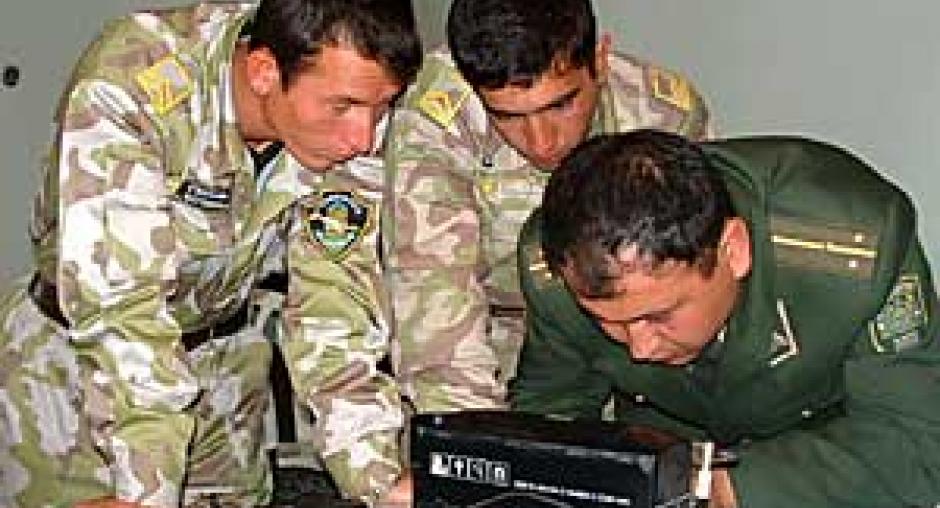Newsroom
Joint OSCE workshop in Tashkent tackles money-laundering and the financing of terrorism
TASHKENT 6 October 2003

(OSCE/Helmut Gram)Uzbek border guards and customs officials at an OSCE training course at the Uzbek-Tajik border, October 2003. (OSCE/Helmut Gram) Photo details
TASHKENT, 6 October 2003 - Money laundering is a direct threat to both national and international security, therefore international co-operation is essential in combating it, experts heard during a two-day joint OSCE workshop in Tashkent, Uzbekistan, that began today.
Opening the National Workshop on Combating Money Laundering and Suppressing Financing of Terrorism, the Uzbek Deputy Minister of Foreign Affairs, Bokhodir Khalilov, stressed the need to improve his country's legislation.
In his contribution, Marc Baltes, the Deputy Co-ordinator of the OSCE's Economic and Environmental Activities, told the participants that each international organization had something to contribute to the fight: "The OSCE focuses on addressing factors that provide fertile ground for terrorism. The consequences of money laundering have to be seen as a threat to national and international security."
The meeting, jointly organized by the OSCE, the United Nations Office on Drugs and Crime (UN ODC) and the Central Bank of Uzbekistan, is the fifth in a series of national workshops aimed at implementing an Action Programme, which was endorsed at the December 2001 OSCE Bishkek Conference on enhancing security and stability in Central Asia.
James Callahan, UN ODC Representative for Central Asia, stressed that countries do not have a choice about whether to take action against money laundering or not: "There can be no effective confrontation of these threats by the international community if there are gaps or weaknesses, if some states do not play their part.
"For this reason we are very grateful that the Government of Uzbekistan has graciously extended the invitation to hold and support this workshop", he said.
Representatives from various national institutions of Uzbekistan, including the Central Bank, government ministries, customs, prosecutors, judiciary and parliamentary committees and the banking sector, as well as experts from the UN, Austria, Canada, Croatia and the World Bank, are exchanging their experiences in legislative and technical aspects of the issue.
This is aimed at assisting the development of corresponding legislation and administrative structures in the country.
The two-day workshop will be followed by a similar event in Dushanbe, Tajikistan later this week.
Opening the National Workshop on Combating Money Laundering and Suppressing Financing of Terrorism, the Uzbek Deputy Minister of Foreign Affairs, Bokhodir Khalilov, stressed the need to improve his country's legislation.
In his contribution, Marc Baltes, the Deputy Co-ordinator of the OSCE's Economic and Environmental Activities, told the participants that each international organization had something to contribute to the fight: "The OSCE focuses on addressing factors that provide fertile ground for terrorism. The consequences of money laundering have to be seen as a threat to national and international security."
The meeting, jointly organized by the OSCE, the United Nations Office on Drugs and Crime (UN ODC) and the Central Bank of Uzbekistan, is the fifth in a series of national workshops aimed at implementing an Action Programme, which was endorsed at the December 2001 OSCE Bishkek Conference on enhancing security and stability in Central Asia.
James Callahan, UN ODC Representative for Central Asia, stressed that countries do not have a choice about whether to take action against money laundering or not: "There can be no effective confrontation of these threats by the international community if there are gaps or weaknesses, if some states do not play their part.
"For this reason we are very grateful that the Government of Uzbekistan has graciously extended the invitation to hold and support this workshop", he said.
Representatives from various national institutions of Uzbekistan, including the Central Bank, government ministries, customs, prosecutors, judiciary and parliamentary committees and the banking sector, as well as experts from the UN, Austria, Canada, Croatia and the World Bank, are exchanging their experiences in legislative and technical aspects of the issue.
This is aimed at assisting the development of corresponding legislation and administrative structures in the country.
The two-day workshop will be followed by a similar event in Dushanbe, Tajikistan later this week.
